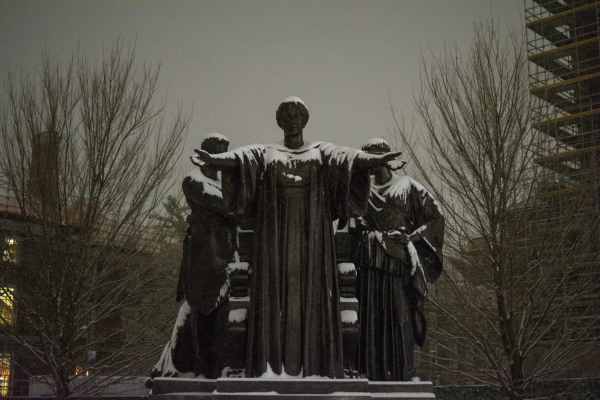Column: Ballot access a victory in Illinois
Sep 21, 2006
I keep wanting to write a column about third parties, independent candidates and voting. I want to write it because there isn’t a voice out there right now, particularly in Champaign County and the State of Illinois, talking about the massive two-party machine in Illinois, that we are in dire need of electoral reform, that the voters need alternatives and any other number of almost frantic political thoughts.
This soapbox is an easy one to get attached to for anyone who holds political ideals; this state is notoriously corrupt. Our last governor, George Ryan, is going to be imprisoned shortly. I’m terrified by this coming November because the population of Illinois is going to collectively choose nothing better than the lesser of two evils.
But then I heard some almost bizarre news. On Sept. 18, two days ago, the United States Court of Appeals for the Seventh District, Illinois’ appellate district, released an opinion in the case of Lee v. Keith changing Illinois’ ballot access laws. These laws have been in place since 1979, and since then, no independent candidates have qualified to run for state legislative office. While this decision does not affect the laws for the establishment of a new party (they are less extreme than the laws for independents), the decision certainly brings to light the constitutionality of blocking ballot access for non-mainstream candidates.
Hopefully, this decision will shed light onto why progressive voters and candidates should have the right to be on the ballot without severe restrictions.
This decision is pivotal, and every voter should care about it. This is why: it notes three crucial problems with Illinois’ ballot access laws that don’t only affect candidates, but voters as well.
Get The Daily Illini in your inbox!
First of all, this ruling changes the deadline for independent candidates to file their petition signatures. Before 1979, candidates had until 92 days before the November general election to collect votes.
Afterwards, candidates had to file 323 days before the election, the earliest deadline in any state in the U.S. In addition to this time restriction, the number of valid petition signatures required to gain access to the ballot went from 5 percent to 10 percent of all registered voters.
Both of these are the most stringent requirements in the United States. In most other states, there is a 5 percent requirement, or even less, and these signatures may be submitted significantly later.
But the third change this decision brings affects voters directly. Before this decision, a voter signing a petition for an independent candidate could no longer vote in primary elections for other candidates or parties.
These three factors, an early filing deadline, a high signature requirement and the limiting of voters’ Primary election activities violate the First and Fourteenth amendment rights of independent candidates. While this appellate court decision does not directly prescribe how to change these existing ballot access laws, it certainly implies that change is necessary and that current laws are unconstitutional. They leave direct changes to laws for the State of Illinois to make.
I know this all sounds really boring, appellate courts and ballot access laws, but it’s big news. Illinois politics, as we’ve all witnessed, is perpetually mired in corruption, scandal, and other chronic political diseases. And no one knows what to do about it. I, for one, am surprised and happy about the court’s decision to finally enact meaningful change in the electoral and political systems of this state.
Of course, nothing is ever going to be perfect, but Illinois could at the very least stray away from being dead last of all the states in the Union in allowing ballot access for independent candidates. This change could, with any luck, lead to other changes and examinations of the Illinois electoral laws.
Who knows? Maybe one day the voters will be given a chance to decide who is and who isn’t a worthy political candidate instead of Party lawyers.





